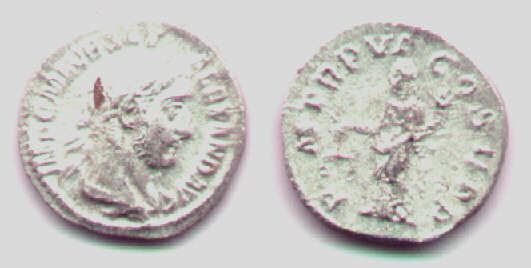 19-18 mm. 12:00
19-18 mm. 12:00 Imitations of Severus Alexander are very common.
Severus Alexander (AD
222-235)
 19-18 mm. 12:00
19-18 mm. 12:00
The style looks official, but the design is quite weak and the
silver break (at the back of the head) does not show a distinct
silver "foil," but the silver is rather thick.
IMP C M AVR SEV ALEXAND AVG, laureate, draped, head right
/PM TRP VI COS II PP, Aequitas holding blanance
and cornucopiae.
This is an official type of AD 227 (RIC 64, page 75).
I wonder if
this imitation was cast in base metal from a genuine piece and
somehow surface silvered afterwards? I need to study it, and the
many others like it, more.
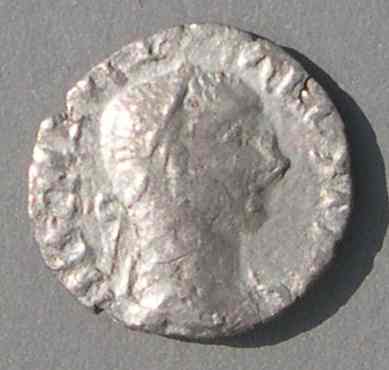
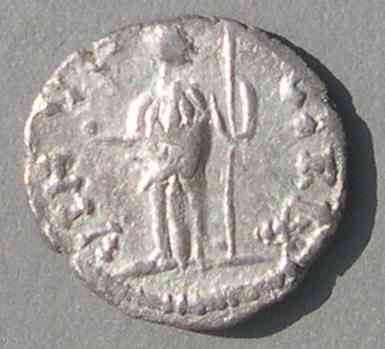 Silver 17 mm. 6:00.
Silver 17 mm. 6:00.
Hybrid imitation. Reverse of Julia Mamaea (or, Julia Domna, who
was earlier).
VENVS GENETRIX
A very crude base silver imitation. I would not regard it as
plated, but solid base silver. Very unusual.
It is both cruder workmanship and better silver than almost all
Severus Alexander imitations. A mystery.
A remarkably sharp strike.
This coin shows no sign of silver, but is struck, not cast.
I don't understand it. Without silver, how could it be deceptive?
Why is the workmanship so good?
This is the sharpest AE imitation I have seen of the period.
IMP C M AVR SEV ALEXAND AVG, laureate, darped, cuir. bust right
/PM TRP VII COS II PP, Mars standing right with
reversed spear and shield
Prototype: RIC 74, p. 76, AD 228.
Black, of official style. Probably a cast.
IMP SEV ALEXAND AVG
/PR TRP VIII COS III PP, Sol standing slightly
right, head left, raising right and holding globe in left.
Sear 2128/9. RIC 102, page 78 of AD 230.
BMC 630, page 177, plate 22.630 (3.29 grams) AD 230.
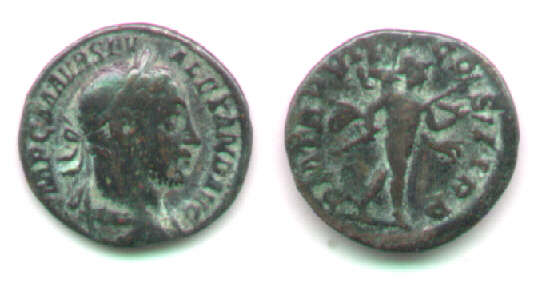
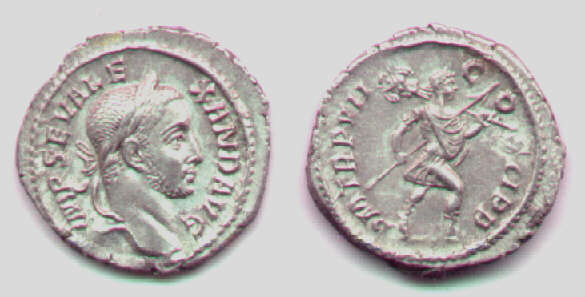
Glossy dark imitation. Possibly cast, although the edges do not
show any signs of it. The lettering, though, is not crisp.
AE18. 6:00. 2.47 grams.
IMP C M AVR SEV-ALEXAND AVG
/PM TRP VII COS II PP, Romulus or Mars (or
emperor) advancing right with spear in right hand and trophy over
left shoulder.
Prototype here: AR20. 6:30. RIC 82 "later part of 228". Sear
2227. BMC 507, issue 9, late 228.
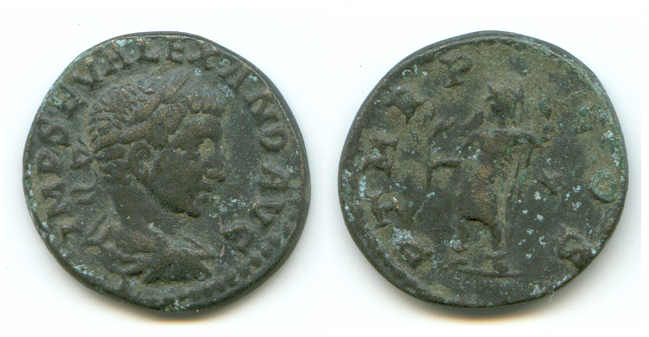 AE18. 12:00. 3.04 grams.
AE18. 12:00. 3.04 grams.
Official style for the "Eastern mint", but with a spelling error.
IMP SEV ALEXAND AVG, laureate, draped, cuirassed bust right, seen
slightly from the rear
/PTMRP COS [sic --
"PTM" instead of the correct "PMT"]
Mars standing left, holding branch and
spear.
Prototype Sear 2.7980. BMC 1007, plate 32 with PMT, struck AD 222
"Eastern mint, issue 1."
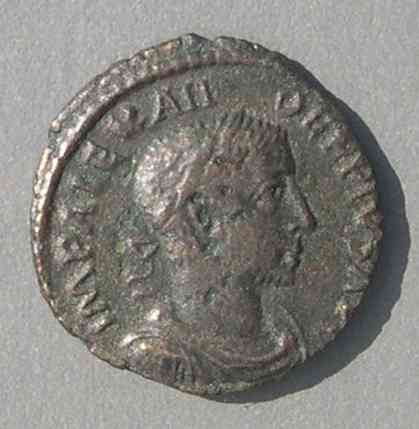
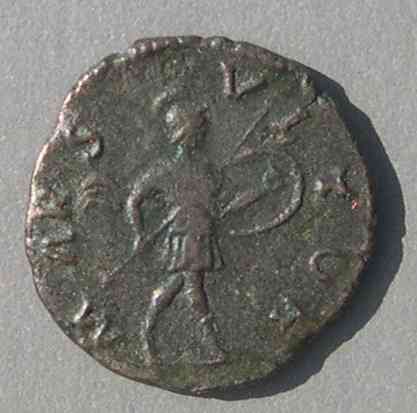 AE 18. 3.02 grams. 12:00.
AE 18. 3.02 grams. 12:00.
Struck, but with no remaining silver.
MARS VLTOR Mars walking right holding spear and shield
BMC 831 for prototype.
"issue 15, 232 AD"

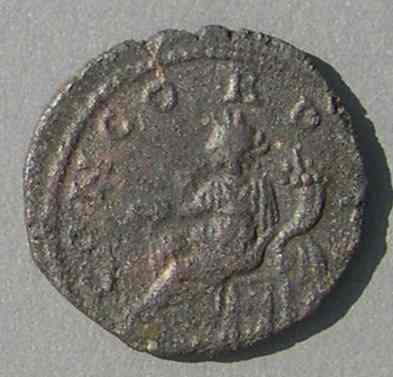
Young portrait.
AE18-17. 2.53 grms. 12:00.
CONCORDIA
Prototype RIC (Antioch) 275 of 223 AD.
BMC 1051 "Eastern mint" plate 32, "223 AD"
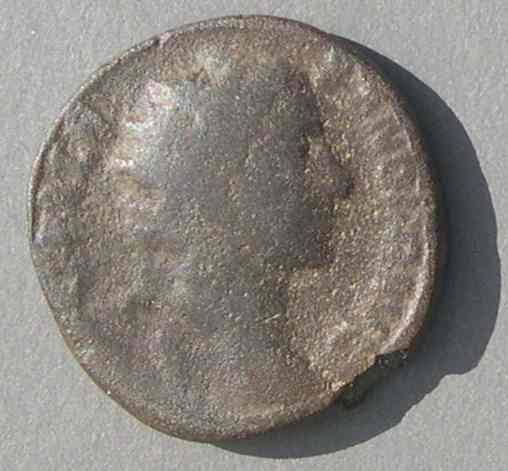
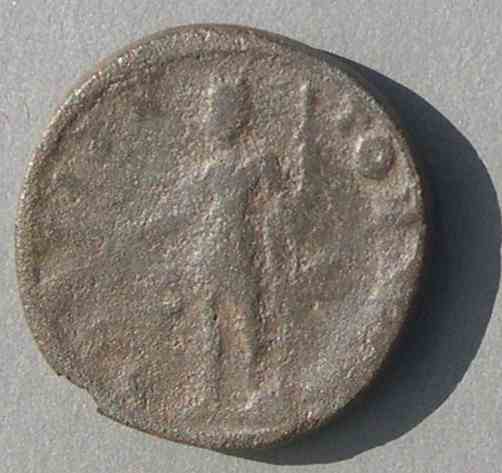
Cast "limes falschung". An unusual cast dupondius.
AE 21. 12:00. 5.86 grams.
Clearly larger and thicker than a denarius or antoninianus.
Ironically, the reverse is
RESTITVT MON
RIC 601prototype is "scarce."
The original should weigh 9 - 12 grams.
The type is discussed for a page in BMC p. 70.
Julia Mamaea
Mother of
Severus Alexander, with coins issued from the beginning
of his reign to at least 233.
A high grade and well struck fourrée. The reverse type is
not a type that belongs with a female obverse, and that type was,
of course, not issued by Mamaea.
IVLIA MA-MAEA AVG, diademed, draped bust right
/VIRTVS AVG, Virtus standing left, holding
globe (should this be Victory on globe?) and reversed spear.
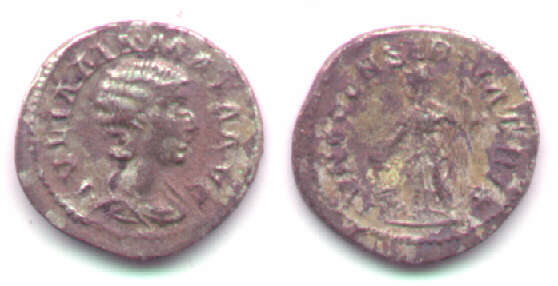
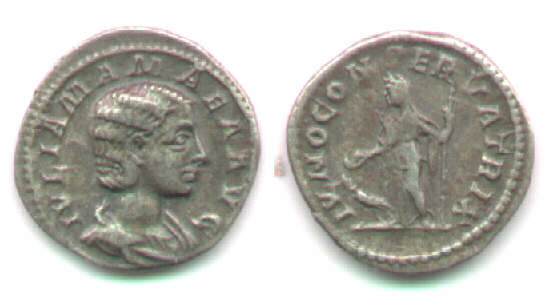
19mm.
7:30. 2.77
grams.
Prototype: AR20. 6:00. 2.90
grams
Fourrée of very good style. The obverse is quite well done,
but less care was expended on the reverse.
Official coins almost always have a die axis near 6:00 or 12:00.
One at 7:30 would strongly suggest an imitation, even if the
silver-over-copper were not so clear.
IVLIA MAMAEA AVG
/IVNO CONSERVATRIX, Juno standing left, holding
patera and sceptre, peacock at feet.
Sear 2310. RIC 343, page 98, plate V.4, struck "later 222"
at Rome.
Continue with the next
page on imitations of Maximinus
(235-238)
Return to the index page on Severan imitations.
Return to the main page on Roman imitations.